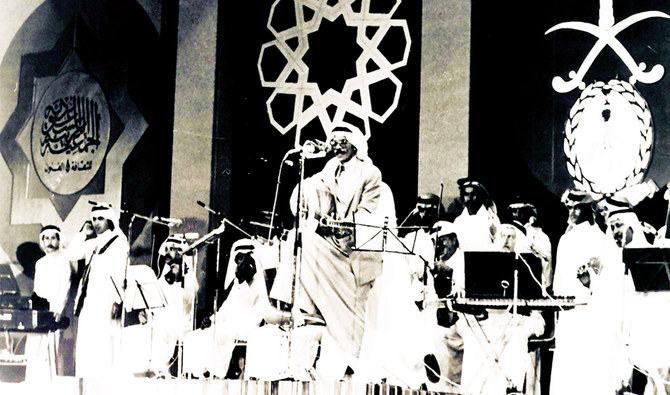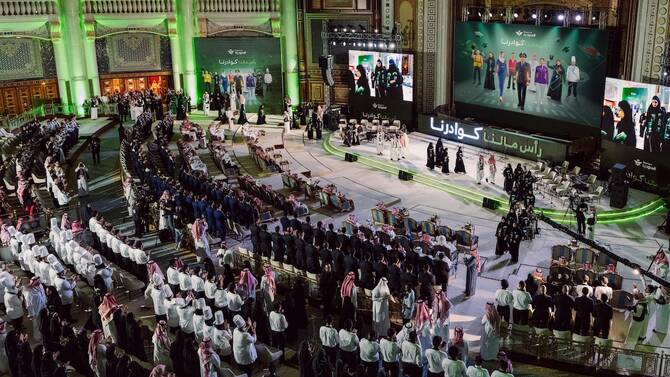JEDDAH: A conservative brand of Islam has always existed in Saudi Arabia, one of the many strands of Saudi society. However, in the wake of the 1979 Grand Mosque siege, this school of thought gained increasing prominence, spreading into official institutions including the legal system and education.
Saudi society began to lose its artistic and cultural moorings under the influence of religious hard-liners who attacked music, sculpture, painting and photography, along with a host of other artistic activities. Regressive social ideas were widely propagated via schools, universities and mosques.
Conservative preachers argued that new entertainment devices — the record player, radio, cassettes, videotapes or television — were forbidden in Islam as they encouraged moral corruption and symbolized the technological domination of the West.
In 1965, shortly after the launch of the official Saudi TV channel, a group of extremists attacked the Saudi Broadcasting Authority building, claiming that the development was a threat to the Muslim nation.
This reactionary movement, which later morphed into the “Islamic Awakening” or “Sahwa,” succeeded in eliminating most forms of entertainment, including those with a religious theme.
Abdo Khal, a Saudi author, said that the 1979 attack on the Grand Mosque in Makkah by a group of militants ushered in “an era full of extremism.”
Musical instruments were smashed by the Muhtasibin — volunteers in the religious police — in acts that appeared to have public approval, Khal said.
Although the leader of the Grand Mosque assault, Juhayman Al-Otaibi, and his followers were eliminated, their ideology spread like poison.
“Darkness reigned everywhere,” said Khal. “Television was the first to be affected. People woke up to a raft of prohibitions that turned society into an arid place where all life-affirming activities were prohibited.”
Before 1979, Saudi TV broadcast songs and concerts by Saudi folk bands and artists, including female singers such as Toha, Etab and Ibtisam Lutfi, as well as concert performances by Um Kalthoum, Fayza Ahmad, Samira Tawfik, Najat Al-Saghira and Farid Al-Atrach.
However, after the war on entertainment and the arts was launched, generations of Saudis grew up deprived of their rich cultural and artistic heritage, unaware of their country’s important role in regional art, music and culture.
According to researcher and critic Yahya Yzuriqan, the first Saudi radio station was established in 1948 in Makkah. It was later moved to Jeddah, where it flourished, recording and producing musical plays, and becoming the first building block of the modern Saudi music sector.
In Riyadh, there was no music on an official level until Riyadh Radio was founded in 1964. However, singers from other Gulf countries often visited the city, and Saudi folk music was a staple of official and private occasions.
The real renaissance of Saudi musical arts began in the 1960s when the Saudi army band was established. It was later transformed into an orchestra, featuring Arab musicians from Syria, Lebanon and Egypt, and is credited with sparking a musical revival across the Kingdom.
Private musical production and marketing companies soon emerged in Al-Ahsa, Riyadh and Jeddah, in addition to talents in poetry, and music composition and performance.
Saudi society was introduced to local voices such as Ghazi Ali, Talal Maddah and Jamil Mahmoud. Some singers — Mahmoud Halawani, Mohammed Ali Sindi, Abdullah Mohammed and Fawzi Mahson — gained fame as wedding performers. The list of contributors to that era is long, but two people — composer Omar Kadars and poet Taher Zamakhshari — deserve special mention. Private companies that appeared included Riyadh Phone, a recording studio established in 1964 by Talal Maddah and Lutfi Zaini.
The studio shut down after a few years when cassette tapes began to replace vinyl records in Saudi Arabia.
Talal Maddah, a Saudi composer and singer who became hugely popular across the Middle East, was known as “The Earth’s Voice” to his admirers in the Kingdom.
Maddah’s career took off in the late 1950s with the release of his first album, “Wardak Ya Zaree Al-Ward” (“Grower of Roses”).
Another prominent figure in that era, Saudi composer Tareq Abdul-Hakim, was a key player in the Kingdom’s musical renaissance.
Abdul-Hakim, who composed the Kingdom’s national anthem, was among the first Saudi students to be granted a music scholarship. He was twice elected president of the Arab Music Academy and received the IMC-UNESCO International Music Prize in 1981.
Saudi music and singing can be divided broadly into two schools. Ibtisam Lutfi represented the Hijazi school, which was headed by her teacher, Talal Maddah. Well-known singers who belonged to this school included Toha, Lutfi Zaini, Fawzi Mahsoun, Siraj Omar and Abadi Al-Jawhar.
The Najdi school was represented by Abdullah Al-Sreikh, along with Abu Saud Al-Hammadi, Abdullah bin Salloum, Fahd bin Saeed, Bashir Hamad Shannan and Hamad Al-Tayyar.
Singers of both schools were anything but purists, and collaborated with artists from around the Middle East.
Although most of the famous names were male, the few female voices proved hugely influential. The most popular female singer was Ibtisam Lutfi.
Lutfi, whose real name was Khayriya Qurban, was blind from a young age. Like so many others, her musical career began singing at weddings feasts in Jeddah. At the age of 16, Lutfi’s melodious voice gained her an invitation to perform at King Faisal’s council.
King Faisal was impressed by Lutfi’s performance. She said in one of her interviews that he asked her: “What do you wish?” Her response came as a surprise. “I want to be the first Saudi woman to sing on radio,” she said.
Two months later, her wish came true when she received an invitation to sing for a radio station. In 1986, she became the first female voice on a Saudi TV broadcast.
Music was freely available at the time. Poet Ahmad Abdul-Haqq, a witness to the period before the “Awakening” movement, said that people could listen to music on radio and, later, on TV.
“We used to look forward to the Saudi TV theater program, which introduced us to the local Saudi stars,” Abdul-Haqq told Arab News.
Saudi music and arts proved resilient in the face of the prevailing religious orthodoxies, he said.
Despite the obstacles placed in their path, Saudis continued to represent their “heritage and the authentic arts and show them to the world,” Abdul-Haqq said.
But when official support began to dry up, some artists focused on the private sector and individual initiatives, while others moved abroad to continue their careers.
With the advent of the “Sahwa” movement, society’s need for music began to be satisfied in other, less visible, ways.
Many Saudis, especially women, took to singing at private gatherings and special occasions such as weddings.
“Awakening” activists tried to fill the vacuum with Islamic Nasheed, a form of religious-themed devotional singing involving minimal use of musical instruments and avoiding romantic themes.
However, those who continued to believe that music was forbidden in Islam created a new kind of music, Shailat, that relied on human sounds and the keyboard.
Muteb Al-Hallaj, a Saudi musician, said Shailat “came at a time when musical concerts were no longer performed in Saudi Arabia.”
“But now we can see that Saudis are thirsty for music. The success of recent concerts organized by the General Entertainment Authority is proof,” Al-Hallaj said.
Saudi Arabia’s first major concert in almost seven years was held in Jeddah in February 2017 when an 8,000-strong crowd sang along to love songs by Rabih Saqr, Mohamad Abdo and Majed Al-Muhandes for more than six hours.
In view of the social changes taking place across the Kingdom, many young Saudis see the current period as a second “Awakening.”
In 2018, the General Culture Authority in Riyadh announced the formation of the Saudi National Music Band, led by Abdel Rab Idris, a prominent Saudi singer and musician who contributed to the Kingdom’s cultural flowering before and after 1979.
With the creation of the General Entertainment Authority in 2016, Saudi Arabia is striving to build a world-class entertainment industry.
The Kingdom’s doors are now open for local, regional and international stars to start tapping into the Kingdom’s potential as a key regional cultural hub.





















